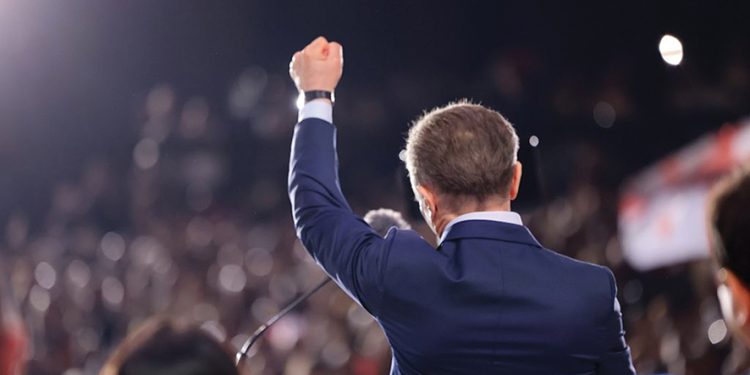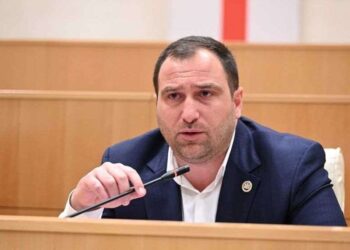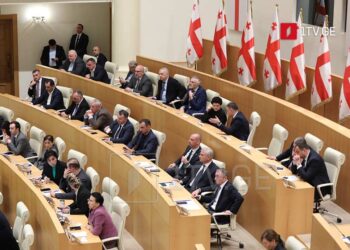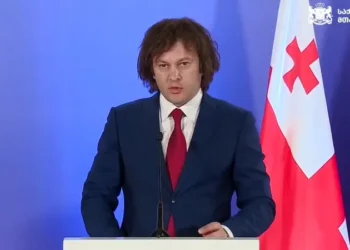Luis Navarro is the former director of the National Democratic Institute in Georgia (2009-2014) and is Eurasia Program Fellow at Foreign Policy Research Institute. He was also both presidential campaign manager and the last chief of staff for then-United States Senator Joe Biden (2007-2009). Radio Free Europe/RL’s Georgian Service sat down with him to talk about Georgia’s latest political drama.
Tell us your thoughts on what’s been going on. Where do you see this heading?
Unfortunately, Georgia has a government which came into being in no small measure because of the excesses of its predecessor. But with the significant difference being that there were indications all along about what the oligarch’s true motives were from the very beginning. The first thing I would point to is his claim in 2012 that he had sold off his Russian base assets. He never provided any proof to back that up, nothing about that was transparent: Who did he sell to, for how much, when? Nothing. And it is remarkable to me how many people outside of the government took that at face value. Then, at least as early as a press conference he gave in April of 2013, he made it very clear that he was the one to be trusted with creating the only true opposition in Georgia: Having defeated the government, he would now create an opposition to the government, the point here being that this guy from the very beginning asserted that he would have complete control of the political landscape, even including the opposition. And then, the last point I would make is his targeting, his public questioning, of the legitimacy of the NDI and IRI, and generally both organizations’ polling. John Bass was great, but most of his successors, for whatever reasons, decided that placating the oligarch was more important. And so once Bass had departed, and Ivanishvilli realized no-one would be standing up for us, he figured, “then clearly I can go after them, regardless of who funds them.” So his antagonism toward the political opposition, NGOs, and the lack of transparency around his ties to Russia, have been evident for all to see from the very beginning.
He thinks membership in the EU is for the Georgian gov’t to decide, on their terms
At Monday’s rally, he chose to publicly double down, saying that somehow membership in the EU is for the Georgian government to decide, on their terms, and that their willingness to enter is predicated on them retaining everything there is about them. But that’s not how joining a club works in any context. I think this re-introduction of the foreign agents’ law is directly connected to how Ivanishvili views the Western reaction to Ukraine; he sees anti-Ukrainian political forces ascendant and capable of delaying aid to Ukraine, in the United States as well as Europe. And so, he thinks, again, as with the NGOs, if the EU are not willing to stand up for their own goals, well, then clearly that leaves him room to determine them himself.
The reintroduction of this foreign agents’ law is a direct response to what he sees as Ukraine’s diminishing fortunes in the West
What does he expect them to do?
I think he wants to have the EU be the one to walk away (from Georgia). Georgian Dream all but dared the EU not to grant candidate status; they were stunned when they received it. And now they are making it abundantly clear that they cannot do that, they are unwilling to pursue that path; they claim the price of candidate status is too high and requires Georgians to give up their sovereignty and Georgianness in order to be a part of Europe, and the answer to that is “well, then perhaps it’s preferable to be in Russia’s sphere of influence after all.”
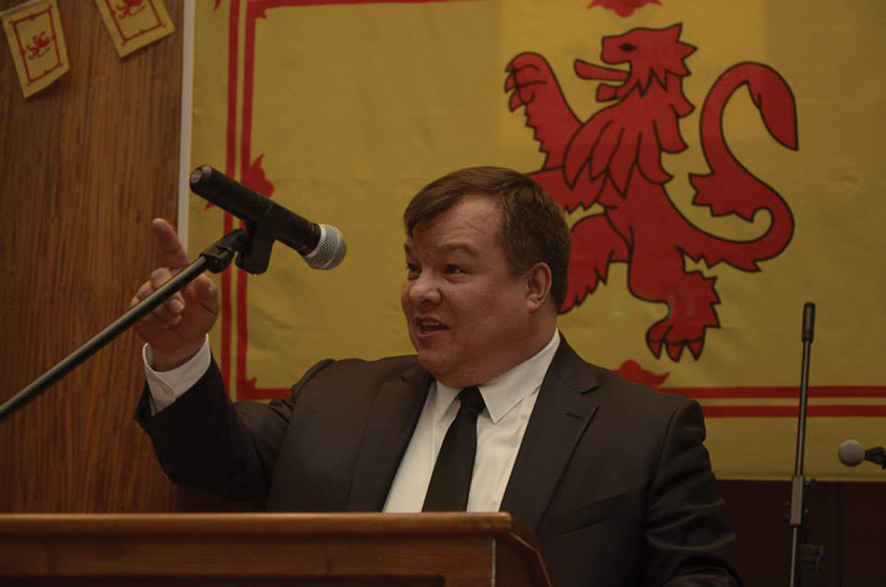
What is the global war party the Georgian Dream and Ivanishvili himself refer to as the cause of all their troubles?
It is an extension of the very first narrative that brought Ivanishvili to office, which is that Misha propagated a war that ended in Georgia’s diminishment. His narrative is that this is the West’s fault, both 2008 and the war in Ukraine. As I said earlier, the reintroduction of this foreign agents’ law is a direct response to what he sees as Ukraine’s diminishing fortunes in the West. So, if the West is not going to step up, and do everything on behalf of Ukraine, then, clearly, he can do what he wishes in Georgia. And even though he never explicitly says we should be aligned with Russia, his rationale always comes down to, “we should never do anything that would displease Russia.”
If there is no sufficient effort by the West, opposition, NGOs, media, to educate the people why it matters for them, Bidzina’s millions and the Kremlin will carry the day
You mentioned him targeting the NDI, the organization you were a head of. What was the beef about there?
Well, I don’t think it was personal, because I had a number of private engagements with him in the presence of other people from my organization, and in those meetings, he could not have been more courteous, I don’t want to say friendly, but, you know, hospitable. This happened only in the public narrative, and the framing of it was essentially the same as his framing of NGOs: “This is a US-funded entity that is supporting my political opponents, Misha and the United National Movement.” And his entire basis in this was simply that we didn’t produce results that aligned with his views or the way he wanted us to do things. His belief was that “if somebody is criticizing me and mine, then they’re wrong. They must be wrong.”
Georgian Dream has provided a detailed description of who they consider as enemies of the people and country. By that description, you qualify as one. What would your retort be to that accusation?
All I can say is that if all that is required to be an enemy of the state is to not be aligned with supporting Ivanishvili, his aims and objectives, then what more can be said? As with so many other authoritarians, the goal is to polarize. “Everybody who’s not with us is against us, full stop.” You see that with Trump, you see that with LePen, with Modi, with Orban. You saw that with the Law and Justice Party in Poland, the only anti-Russian force among all of them. It’s the “us against the world” attitude. “And only if you are exactly like us, and only if you agree with 100% of what we say, then you’re legitimate, otherwise you are a foreign agent, receiving foreign aid.” And the remarkable thing about this is the amount of tangible economic support Georgia receives from the West, including the military structures. And then you see this ridiculous narrative, which says, “oh, well, if they give us money, it’s okay. We know we can trust ourselves.” It’s absurd.
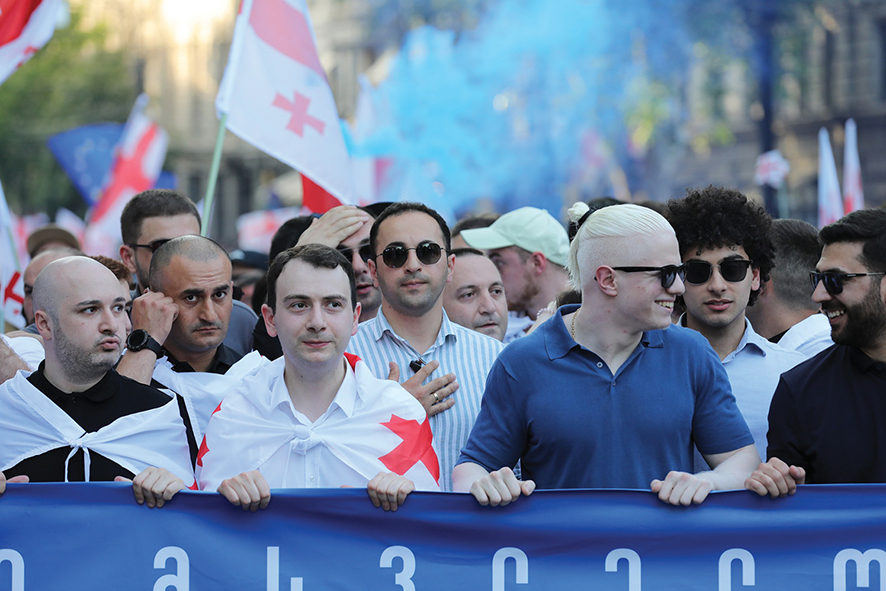
During your tenure as the NDI head, you witnessed the worst years of the former government and then the coming of this one. How do they fare in comparison, in terms of repression, authoritarian rule, and so on?
Well, whatever the excesses of the previous government, including to whatever extent they bear responsibility for making this government possible, there is a qualitative difference, I think. There have been authoritarian minded politicians in the West, whether it’s the Law and Justice Party in Poland, or Trump in the United States, but they are simply not comparable in the scope of their reach into society to that of Putin in Russia. And the latter seems to be the desired model for this government. It’s not like when they disagree with something, they will try to tip the scales against you in a system that they present as even handed. That is not their modus operandi: Their modus operandi is, “we will make you pay for not agreeing with what we are saying, and it will be brutal and it will be unremitting.” That is the qualitative difference.
Give us a short prognosis on the coming elections, thankless as that task might be. What can we expect?
Regardless of what the political operatives may believe, all of the money and organization you have matters, but, typically, it only matters at the margins. The narrower the victory, the more those elements can be attributed to the outcome. At the end of the day, elections are decided based on the mood and motivation of the people. And there simply isn’t enough money. There’s never enough money to persuade all the people. So if the population’s response to the actions of the government and the apparent intent of this government to walk away from Europe, Western integration (as reflected by those in the streets tonight), then I would argue that this government is in big trouble, and there will be no way for this government to retain power outside of direct, broad malfeasance. However, if there is not sufficient effort by all concerned, the West, opposition, NGOs, media, to engage in a nationwide, grassroots effort to educate the people why it matters for them, then Bidzina’s millions, Georgian Dream’s administrative resources, and the Kremlin interference, will carry the day for them.
Interview by Vazha Tavberidze

